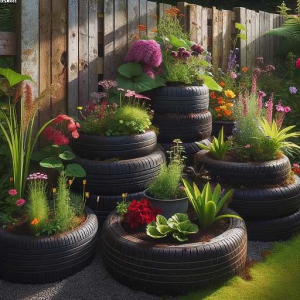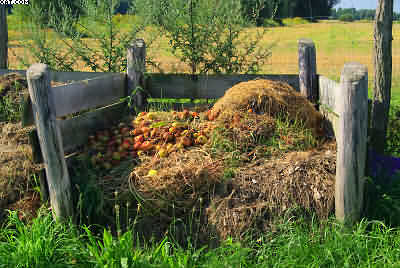composting garden waste including leaves
composting garden waste including leaves
composting garden waste including leaves
Of course, most gardeners know all about composting. From small gardens to large gardens then composting is probably one of the most common things that gardeners all over the world have in common. So, there are many ways that this can be done from home made composters to specially bought ones, they are all useful in their own ways.
In fact a pile of leaves will compost down on its own without any other help. Indeed this is what I do myself. I am fortunate to have a large garden and during autumn time(fall) collect all my leaves and place them in a pile in a sheltered spot. Of course the leaves start the rotting process immediately. At the end of winter the pile has shrunk and is well on its way to becoming healthy compost.
Local councils gave away compost bins
Composting is a natural process that converts organic materials, such as yard and kitchen waste, into a rich, soil-like substance called compost. So a few years back, this was taken up by several local councils, here in the north of England. These compost bins were large and made of black plastic. Ideal for soaking up any of the suns rays. I still have mine, but do not use it as much as I should!
The organic micro organisms, including worms do like a warm environment to carry out their work of composting. Indeed once the composting process starts you can feel the heat not far below the surface of the composting materials. Fortunate people who live in the countryside can see the same effect on a pile of cow manure. On cold days you can see the steam rising from the pile as it heats up during the composting cycle.
Naturally then compost is a great addition to gardens and can help improve soil structure, promote healthy plant growth, and reduce the need for synthetic fertilizers and pesticides. As I have said earlier then leaves are a great addition to a compost pile. Providing a number of benefits when they break down. The rotted leaves are rich in nutrients, including nitrogen, phosphorus, and potassium, and will help improve soil structure and fertility.
Here are some tips for composting leaves:
- Collect leaves in the autumn (fall), when they are abundant and easy to gather. Rake them into a pile or bag them up with black bin liners and store them until you are ready to compost them.
- Shred the leaves before adding them to the compost pile. This will help them break down faster. I use my electric lawn mower for this job but a leaf shredder is just as good.
- Add a mix of green and brown materials to the compost pile. Green materials are high in nitrogen and include things like kitchen scraps and grass clippings. However I find grass clippings difficult in winter as the grass is often too wet to cut. Brown materials are high in carbon and include things like leaves, twigs, and shredded newspaper. A mix of the two is ideal for composting.
- Keep the compost pile moist but not waterlogged. Water the pile regularly, this is highly important especially during dry spells, to keep it moist. Too much water, however, can create anaerobic conditions that can slow down the composting process. Sometimes too much water and create a horrible slimy mess and no good for the garden.
- Turn the compost pile regularly. This is also important and helps to aerate the pile. Thus, speeding up the composting process. You can use a pitchfork or shovel to turn the pile every week or two.
- The compost is ready to use when it is dark and crumbly and looks like soil. This can take anywhere from a few months to a year, depending on the size of the pile and the conditions.
By following these tips, you can effectively compost your garden waste, including leaves, and create a rich, nutrient-dense soil amendment for your garden. Some people build large compost heaps from old wooden pallets and split the composting into different stages. The final stage produces the compost ready to use on the garden.



